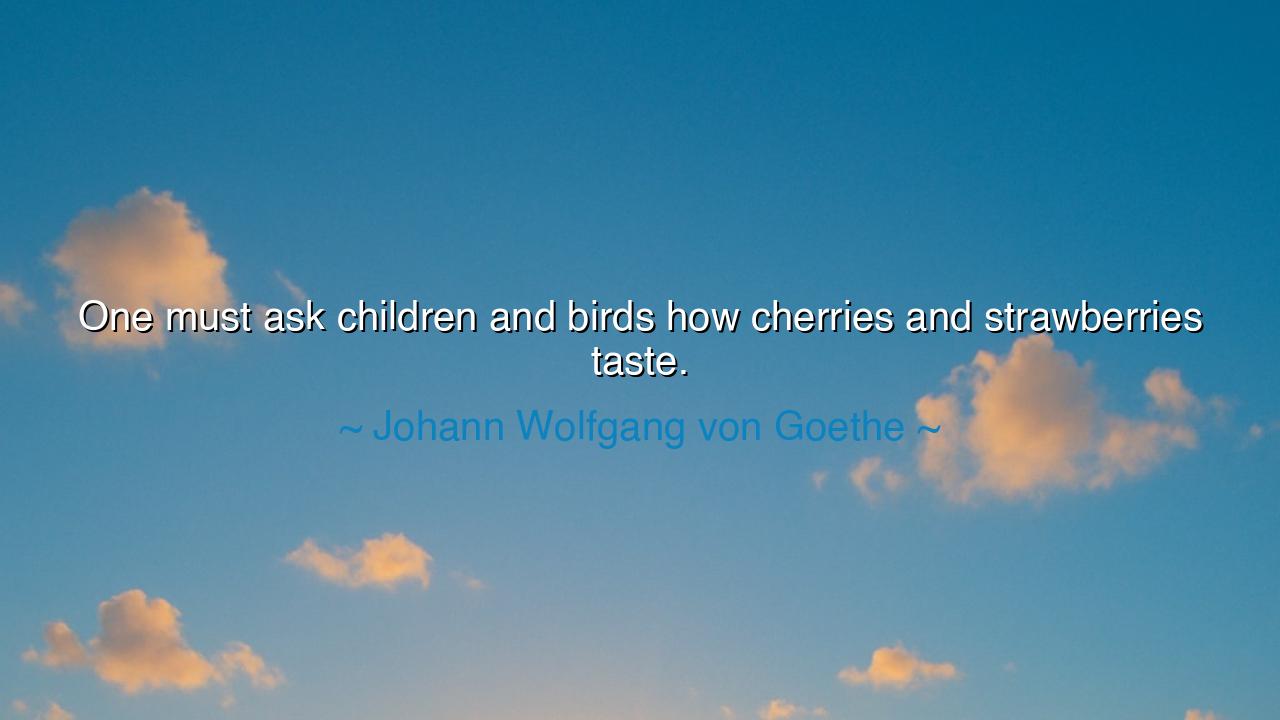
One must ask children and birds how cherries and strawberries






Hear the gentle wisdom of Johann Wolfgang von Goethe, poet, philosopher, and seer of the human spirit, who once said: “One must ask children and birds how cherries and strawberries taste.” At first, the words may sound playful, almost lighthearted, but within them lies a profound truth: that innocence and immediacy reveal reality more purely than intellect alone. For the scholar may analyze the fruit, weighing its sugar, describing its form, but the child and the bird, tasting it with joy and simplicity, know its essence more deeply.
The meaning is clear: wisdom is not always found in learned volumes or heavy discourse, but in those who live close to life itself. The child, unburdened by pride or pretense, speaks of sweetness as it is, unfiltered by calculation. The bird, guided by instinct and purity, seeks only what nourishes and delights. Goethe teaches that to understand life’s simplest treasures, we must return to simplicity itself. For it is often those closest to nature who perceive most truly.
Consider the story of Francis of Assisi, who spoke of learning from the sparrow, the lamb, the humble creatures of God. While scholars debated theology in lofty halls, Francis saw in the birds a pure faith, a direct joy in existence. He blessed them as teachers, as Goethe blessed both children and birds as witnesses to truth. The lesson is that wisdom is not always crowned in robes; sometimes it sings in a bird’s song or shines in a child’s laughter.
History, too, recalls the painter Paul Cézanne, who sought to capture nature as it truly appeared, unclouded by convention. He once said he wanted to paint with the “fresh eye of a child,” to see the apple or the cherry as though for the first time. In this pursuit he echoed Goethe’s insight: that true knowledge is not always in mastery, but in wonder; not in analysis, but in presence.
Yet Goethe’s words also carry a deeper challenge. In our striving for progress, in our endless pursuit of power, we risk losing the ability to see simply, to taste purely, to rejoice like children and birds in the gifts of life. We risk turning fruit into commodities, trees into resources, and forget the sweetness they once brought to the soul. To ask the child and the bird is to humble ourselves, to remember that joy and wisdom are not possessions but experiences.
O children of tomorrow, take this lesson into your hearts: seek not only the knowledge of scholars, but also the knowledge of innocence. Do not forget to listen to the laughter of a child or the song of a bird, for they speak truths beyond calculation. Taste life as they do—with wonder, with gratitude, with presence. For in this simplicity lies the deepest richness.
Therefore, let your practice be this: when you eat, taste fully; when you walk in nature, notice deeply; when you encounter the young or the small creatures of the earth, learn from them. For they remind us that life’s truest treasures are not complicated, but simple, not hidden, but plain before us. The sweetness of cherries, the joy of strawberries, the beauty of existence itself—these are best understood by those who live without pretense.
Thus Goethe’s words endure: “One must ask children and birds how cherries and strawberries taste.” Let them remind you that truth is often found not in the lofty, but in the humble; not in analysis, but in joy. And if you would be wise, learn again to see as a child, to live as a bird, and to taste life with the freshness of wonder.






AAdministratorAdministrator
Welcome, honored guests. Please leave a comment, we will respond soon